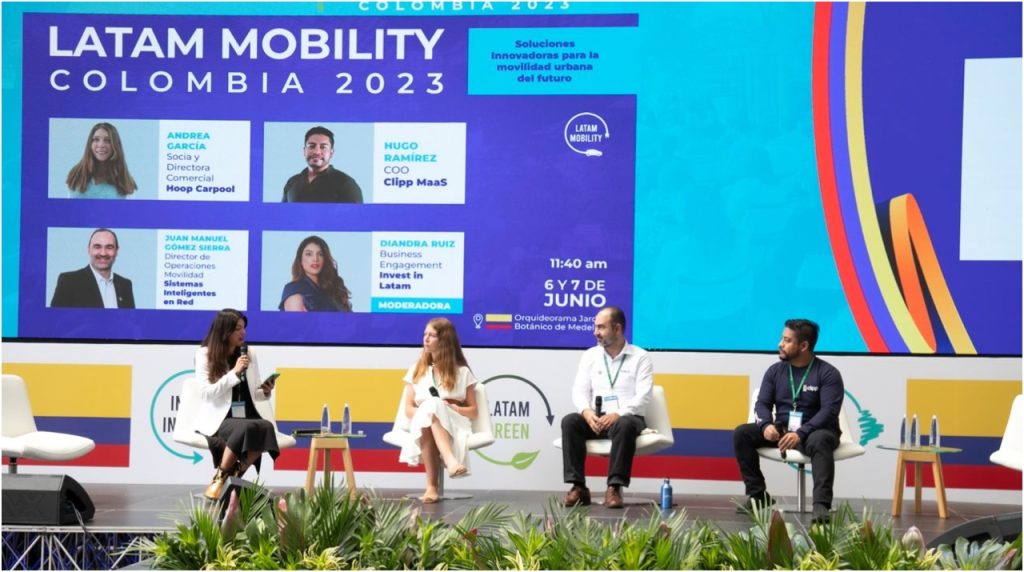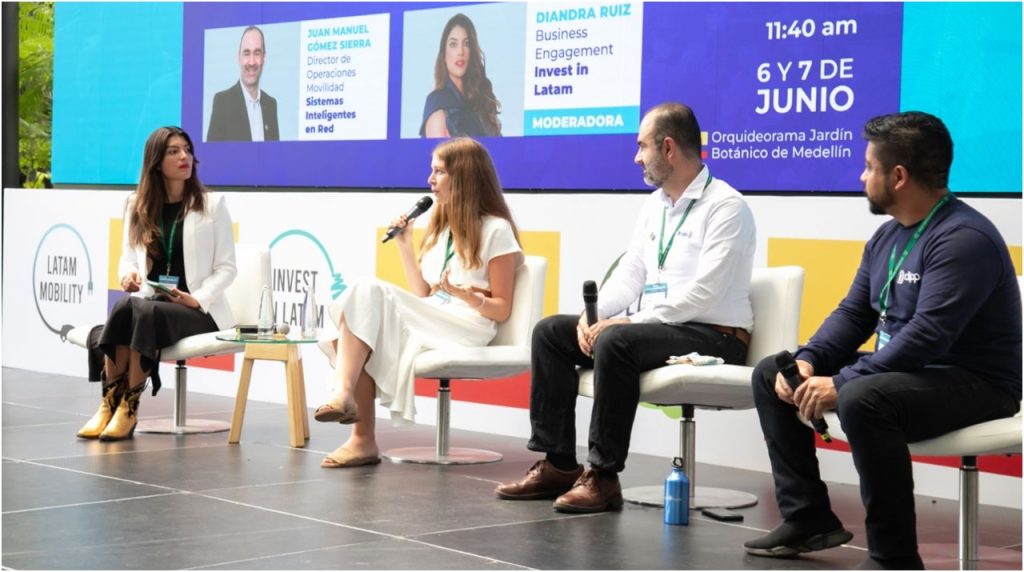On June 6 and 7, the Latam Mobility Summit 2023 was held in Colombia, an outstanding meeting organized by Latam Mobility, the leading community in sustainable mobility in the continent, which brought together experts, professionals and industry leaders in the majestic setting of the Orquideorama of the Botanical Garden of Medellin to discuss and explore the way we move.
One of the most outstanding panel discussions of the event focused specifically on Innovative Solutions for the Urban Mobility of the Future, which featured the participation of leading experts in the field: Andrea García, Partner and Commercial Director of Hoop Carpool, Hugo Ramírez, COO of Clipp MaaS and Juan Manuel Gómez Sierra, Mobility Operations Director of Inteia.
These professionals shared their knowledge and experiences, providing valuable insights on how to address current and future challenges in urban mobility, where the panel was moderated by Diandra Ruiz, Business Engagement at Invest in Latam, who facilitated an enriching dialogue among the experts and encouraged the exchange of ideas and perspectives.
Related content: Circontrol, Dielco, Enerlink, Erco Energía, Vehya and Wallbox Boost Charging Infrastructure to Massify Electromobility
Connecting people while saving emissions
Sustainable mobility has become a vitally important issue in today’s society. In a world where traffic and polluting emissions are of increasing concern, it is essential to find solutions that promote a more efficient use of resources and reduce environmental impact. In this sense, Colombia stands out as a country with an ecosystem of innovation in sustainable mobility, especially in cities like Medellin.
One of the initiatives that has emerged in this context is Hoop Carpool, a platform dedicated to carpooling to work. There, Andrea García, representative of the platform, explains that its main objective is to connect people who work in the same company so that they can share empty seats in their vehicles.
This practice not only saves polluting emissions, but also makes it possible to share travel expenses and optimize parking space, where they have managed to establish partnerships with more than 50 multinational companies in several countries, including Colombia, as well as with public and private universities.

In addition, he emphasized that mobility is a basic right of citizens and pointed out the challenges we face today, such as traffic jams where a large number of vehicles circulating with empty seats are observed.
This scenario motivates Hoop Carpool to fight to offer freedom of movement to people and to align companies, universities and public entities in this common goal. On the other hand, beyond providing training and launching challenges to motivate people, they also recognize the importance of technology in this user experience.
It needs to accompany this new approach to transportation and facilitate the use of more sustainable forms of mobility than before, combined with education and incentives, presenting itself as an effective strategy to drive this transformation towards a more sustainable and efficient mobility.
Sustainable Mobility in Smart Cities
In the age of technology and interconnectedness, creating smart cities has become a priority to address urban challenges efficiently. One of the key verticals in the development of these cities is mobility, as it is closely related to accessibility and people’s day-to-day lives.
Sistemas Inteligentes en Red has been at the forefront in the development of platforms for smart cities, recognizing the importance of addressing mobility issues and the need to promote sustainability in our travels.
Juan Manuel Gómez Sierra points out that the increase in urban population and the growing number of vehicles in circulation have generated a series of problems associated with mobility. These include negative externalities, i.e., greenhouse gas emissions and local pollution.

These have a direct impact on people’s health and affect not only transport networks, but also territories in general. Therefore, sustainability has become a global requirement, not only for companies such as Inteia, but also for each individual.
The planet makes an urgent call to rethink actions and take measures to preserve the environment. In this context, sustainable mobility presents itself as a crucial solution to reduce the environmental footprint of our planet.
In this sense, the company has developed an application that seeks to build user loyalty through positive incentives based on good behavior in terms of sustainable mobility. Through this platform, it seeks to create a community in which users are not only consumers of services, but also agents of change who interact with others and adopt responsible behaviors.
In addition, the brand launch of Inteia has been an important milestone in the promotion of sustainability and smart mobility, where the main objective is to raise awareness about the importance of adopting sustainable practices in our daily commutes, thus driving a positive change in the way we move around cities.
Efficient and Collaborative Integration
Technology makes the current society in which we live more connected, with a growing need for efficient urban mobility, therefore, it is essential to address the challenges faced by cities in terms of transportation.
In this sense, the Ecuadorian company Clipp MaaS has emerged as an innovative solution for the integrated management of mobility in cities. Its proposal is based on the integration of the different existing transportation verticals, providing users and companies with a unique application that analyzes in real time the best mobility options, considering aspects such as ecology, speed and economy.
One of the main problems that has arisen in cities is the disconnection between the various transportation options available. Currently, mobility solutions are presented in a fragmented manner, with cab, bus, streetcar and metrobus services, among others, standing out separately in their respective proposals.

This lack of integration hinders the ability of users to make informed and efficient decisions on how to move within the city. Against this backdrop, Clipp MaaS has identified this disconnect as a fundamental problem and has set out to address it holistically.
Its approach is based on the interaction and collaboration of all modes of transportation available in each city, with the objective of showing the feasibility and ease of each of them. The company seeks to manage mobility efficiency, avoiding the presence of empty or single-passenger vehicles circulating around the city.
Instead, Clipp MaaS promotes a collaborative ecosystem that serves as many users as possible with as few vehicles as possible. During its three years of work, the company has faced several challenges, especially in terms of supply and technology, as the arrival of major competitors in the market has been one of the most prominent challenges.
In a country where each transport player worked individually, the company has had to clearly communicate its proposal as an integrating solution rather than a direct competitor. The key lies in making users and industry players understand that Clipp MaaS offers a cross-market where different modes of transport can be combined, providing incentives to encourage the adoption of more sustainable practices.
In pursuit of the welfare of all users, Ramirez stresses that Clipp MaaS focuses on cooperation between the different players in the transport sector rather than direct competition for users. The platform provides a unique environment where users can choose the option that best suits their needs: speed, economy, ecology or incentives.
Thus, Latam Mobility Summit 2023 positioned itself as a key meeting to drive collaboration, innovation and the search for sustainable solutions in urban mobility, by bringing together industry leaders, entrepreneurs and experts in the same space, creating an environment conducive to the exchange of knowledge and the creation of strategic alliances.
Finally, with a commitment to fostering more efficient, sustainable and accessible mobility, Latam Mobility left a significant footprint in the sector, promoting constructive dialogue and the generation of disruptive ideas that will drive the future of urban mobility in the region.




